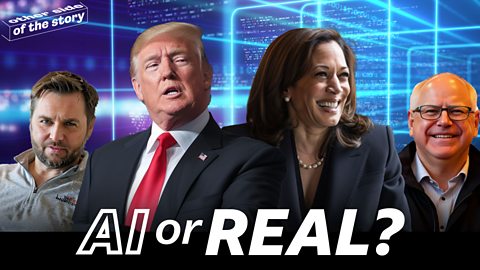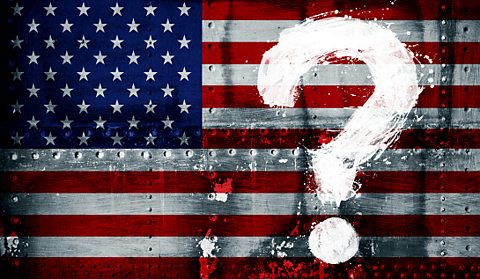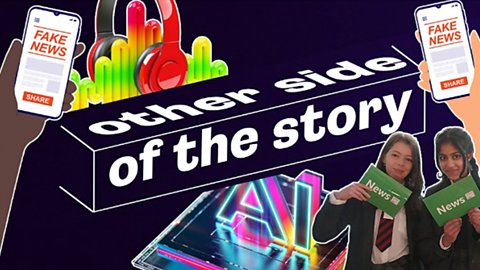With the result of the upcoming US election looking too close to call, famous faces have been throwing their weight – as well as their hundreds of millions of online followers – behind presidential candidates Kamala Harris and Donald Trump.
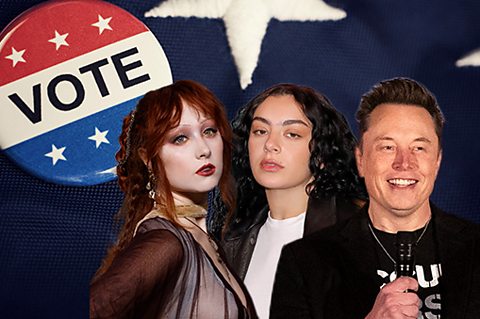
Here’s your handy guide to who’s backing who, who’d rather not back anyone and whether these celebrity endorsements are likely to have any impact when election day comes on 5 November…
Which celebrities are endorsing Donald Trump?
In the red corner…
X owner Elon Musk declared his support for Republican Party candidate Donald Trump in a July post on X that got 220m+ views and 406k retweets on the social media platform. The tech billionaire confirmed his commitment to Trump's campaign when he joined him onstage at a rally in Pennsylvania.
Zachary Levi, best known for superhero movie Shazam!, Disney's Tangled and TV series Chuck, endorsed Donald Trump’s presidency bid onstage at a rally in September and has backed his campaign on X and Instagram where he has 2.1m+ followers. Other celebrities backing Trump include the singer Kid Rock, rapper Azealia Banks and the model Amber Rose.
Which celebrities are endorsing Kamala Harris?
And in the blue corner…
Taylor Swift backed Democratic Party candidate Kamala Harris in an Instagram post that received more than 11.3m likes. Four days after her endorsement, Donald Trump posted ‘I HATE TAYLOR SWIFT’ on his Truth social media platform.
Charlie XCX endorsed Harris back in July, declaring ‘kamala IS brat’ in an X post that received 56m views and 333k likes and Kamala’s campaign team later embraced the ‘brat’ trend on their X platform. Other celebrities backing Harris include Billie Eilish (who posted an Instagram video that had 3m+ likes) and Olivia Rodrigo, who posted a clip on Instagram stories highlighting the presidential candidate’s stance on reproductive rights.
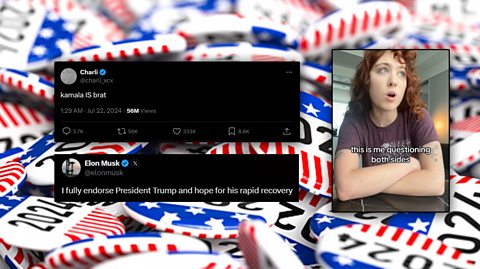
Who is Chappell Roan endorsing and why did she go viral?
When asked why she hadn’t endorsed Kamala Harris, Chappell Roan told the Guardian: “I have so many issues with our government in every way. There are so many things that I would want to change. So I don’t feel pressured to endorse someone.”
The quote was shared widely online - and out of context - in social media posts branding the singer ‘excessively privileged’, ‘cowardly’ and ‘uneducated’. If you read a quote from somebody that’s been lifted from another article, it’s always good practice to go and read the whole interview to get the full picture.
Chappell Roan addressed the backlash on TikTok, saying she will "always question those in power". In a video captioned 'Im done talking about it’, she said that she would be voting for Harris but was not endorsing her, adding “I’m not settling for what has been offered… this is not me playing both sides. This is me questioning both sides.”
Do celebrity endorsements make a difference?
If you follow celebrities who are engaged with politics on social media, you are more likely to see posts about who to vote for or how to register to vote in your FYP or social media feeds. This is because these platforms use algorithms to suggest content it thinks you're going to like.
While it’s not possible to accurately measure the direct impact a celebrity endorsement will have on how someone votes, there has been some research into the effects that famous faces can have during election campaigns.
In September, a YouGov survey in the US found that 53% of those questioned thought that Taylor Swift’s endorsement of Kamala Harris would help the Democratic Party's campaign, while 4% thought it would hurt her cause. Another survey by ABC News/Ipsos found that 6% of voters were more likely to vote for Harris after the singer's endorsement, while 81 percent said it would make no difference and 13% would be less likely to vote for her.
A study by Harvard University found that where famous supporters are more likely to have an impact is around voter participation, saying, “Celebrities have a unique ability to connect with younger generations in ways that mainstream media and other get-out-the-vote efforts may not be able to.”
This was demonstrated during the last US presidential campaign in 2020 when Kylie Jenner posted a link to a voter registration site that led to an 80% day-on-day increase in the site’s total users, and a 1,500% increase in traffic from Instagram.
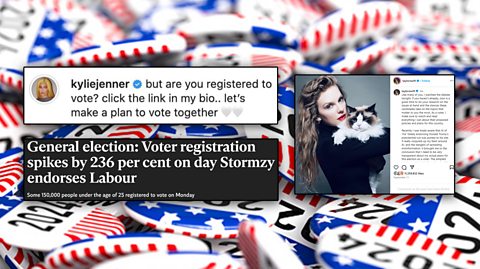
Linktree, a platform that allows creators to promote links on their social media platforms, partnered with the same voting registration site for a recent celebrity campaign that contributed to a 53% increase (compared to 2020) in 18-year-olds registering to vote in the upcoming election.
In September Taylor Swift also shared a link that drove over 400k visitors to the voting registration site during the 24-hour period her Instagram story was live, accounting for more than half of the site’s daily total.
It's also happened in the UK, when back in 2019 voter registration spiked by 236% - including 150,000 applications from people under 25 - on the day Stormzy tweeted in support of Labour.
However, whilst there is data that can tell us how many people registered to vote because of celebrity influence and endorsement, there are many people who are more pessimistic about the effect it actually has.
Some critics say the small number of people who may vote the same way as their favourite celebrity are the ones who were going to vote for the same candidate anyway. The data also doesn't tell us whether they actually did go on to use their vote and even if they did, whether their vote was influenced by the celebrity's political preferences.

Not sure if the news you’re seeing on social media is true or false? Can you always tell if the things you see online are real or fake? Learn how to get the other side of the story with our quizzes, videos and explainers.
